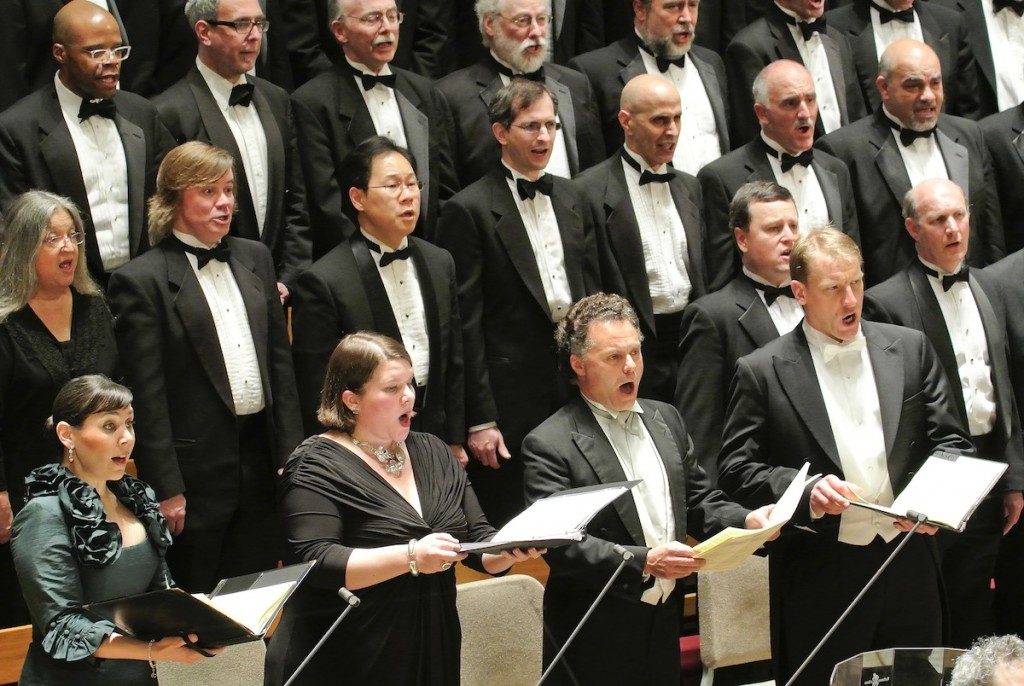After a mixed start, Haitink’s Stravinsky and Beethoven program wraps BSO season on a high note

Soloists Jessica Rivera, Meredith Arwady, Roberto Sacca and Gunther Groissbock perform with the Boston Symphony Orchestra and Tanglewood Festival Chorus in Beethoven;s Symphony No. 9 led by Bernard Haitink Thursday night at Symphony Hall. Photo: Stu Rosner
Appropriately for a program of works that are famous for how they end, the Boston Symphony Orchestra’s performances Thursday night of Stravinsky’s Symphony of Psalms and Beethoven’s Ninth Symphony finished stronger than they started.
The evening began with a sign of serious intent: ushers admonished arriving patrons to be in their seats on time, since there would be no break for late seating during the Stravinsky. And, in fact, Bernard Haitink, the orchestra’s conductor emeritus, led that work as an almost continuous piece, with only the briefest of pauses between its three concise movements.
One wishes one could say all the performers responded with the concentration Haitink asked of the audience. But, although the Symphony of Psalms was commissioned by the BSO in 1930 to commemorate its 50th anniversary, on Thursday the musicians didn’t play it as if they owned it.
Or rather, the choir didn’t sing it that way. While Haitink was able to draw incisive, colorful playing from the unusual orchestra of pianos, winds, cellos, and double basses, the Tanglewood Festival Chorus seemed to go its own way, with weak articulation, sagging pitch, and a generic, soft-centered choral sound that was conspicuously unsuitable for this piece.
Awareness that Stravinsky wrote the upper choral parts with child singers in mind might have prompted the women of the chorus to modify their tone a bit. But whether the sound is child-like or adult, tonal clarity and parts moving precisely together are what this music needs; the chorus managed these when singing loud or in octaves, but faltered elsewhere. Signs of insecurity included some pitch-testing at fugue entrances.
At the work’s end, defying expectations as always, Stravinsky closes his fast, brilliant setting of the jubilant Psalm 150—a favorite text of composers for its many references to dancing and playing musical instruments—by pulling back the curtain on another scene entirely, as ineffably soft, rapt music of rotating phrases over a distant pulse of timpani seems to evoke heavenly spheres turning in space. Paradoxically, to achieve this ethereal mood requires the most focused tone and precise rhythm imaginable, qualities that weren’t in evidence Thursday night; even the orchestra went a little slack in that passage, and Stravinsky’s searching, haunting conclusion had little effect.
The Beethoven symphony began unpromisingly as well, as the orchestra marched through the first-movement exposition, taking little note of its extraordinary agitation and volatility of mood. Haitink’s straight-ahead approach did eventually lead to a sustained fortissimo climax in the development, but after that routine reasserted itself, and the movement’s tragic coda lacked emotional wallop.
Haitink took a fast tempo in the scherzo, and the orchestra didn’t handle it well. The theme’s tiny skipping eighth note often disappeared in the blur, and the violins had some trouble staying together in exposed staccato passages. It may well be that, had the conductor dialed the metronome down a little and gone for accuracy and articulation, the movement would have actually sounded faster.
Haitink moved the Adagio along as well, almost at an Andante, but here the orchestra found its expressive footing, the strings riding the faster tempo in expressive long lines and the winds coming together in finely balanced and tuned ensembles. Haitink expertly managed the music’s many moments of relaxing, then stirring up again.
The finale lost its way at first, as neither the dire, dissonant opening nor the calming Ode to Joy theme had much expressive presence. But the recitative passages—in cellos and basses at first, then in the clear, trumpet-like voice of bass Günther Groissböck—seemed to muster the troops, and orchestra and chorus stepped out smartly, powering out the massed forte passages and even finding some expressive color in the contrasting interludes.
Tenor Roberto Saccà was refreshingly melodious and unforced in the amusingly militant “Turkish” variation, and soprano Jessica Rivera and contralto Meredith Arwady added their clear, agile voices to the well-matched solo vocal quartet. In the end, Beethoven’s Zauber band wieder, to paraphrase Schiller’s Ode—his magic again united all, to provide a satisfying finish to an uneven evening of music-making.
The Symphony Hall audience responded enthusiastically, but saved its warmest ovation for two retiring BSO veterans, bass trombonist Douglas Yeo and violist Marc Jenneret, who were brought to the front of the stage to receive accolades for their 27 and 35 years of service, respectively, with the orchestra.
The program will be repeated 7 p.m. Friday and 8 p.m. Saturday. bso.org; 617-266-1200.
Posted in Performances